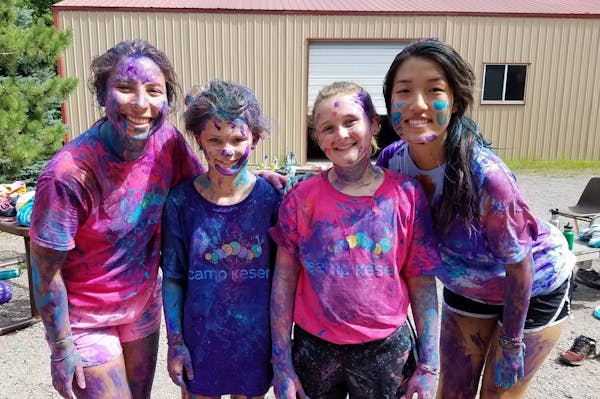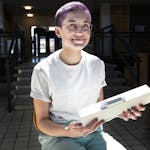It's homeroom period on a Thursday morning, and most of the students at St. Paul's Community School of Excellence are checking in with their teachers, talking with friends or catching up on their homework.
The Asian Penguins have other plans.
Clustered around desks in a classroom, they're disassembling desktop computers and identifying each of the components inside. There's much to learn and little time to waste, because this middle school computer club has big ambitions: learning to install software, refurbishing old computers and then donating them to families in need.
"Right now we've got 20 families who are waiting for computers," Stu Keroff, the Penguins' adviser, announces to his students. "And our policy is that we're not going to give them away unless you guys have done all the work."
Keroff, who is also the charter school's technology coordinator, knows his budding tech experts are up to the challenge. In the seven years since he founded the Asian Penguins, the group has refurbished and donated more than 200 computers. Its sixth-, seventh- and eighth-grade members have set up computer labs at school for testing and homework and given castoff computers new life.
In a school where 84 percent of the students qualify for free or reduced lunch — and most are either the children or grandchildren of East Asian refugees, or are refugees themselves — the Penguins' work is particularly critical. Nearly all the computers the group installs are in the homes of their classmates.
Though access to high-speed internet and the devices needed to connect to it has grown in recent years, persistent gaps based on geography, race and income remain. Nearly half of Minnesota households with an annual income of $20,000 or less had no access to high-speed internet, compared to 5 percent of households making $75,000 or more, according to a U.S. Census Bureau survey.
Computer by computer, the Penguins are working to eliminate the digital divide, which can limit students and their families in a world where technology is intertwined with nearly all aspects of school and work. At this school, like most others, students get classroom assignments, turn in homework and communicate with their teachers online. Keroff said the school subscribes to six separate online academic management systems through which teachers can assign and collect homework. That poses a big problem for students whose families lack the means — or the technical know-how — to log on at home. A majority of the students at the school are part of Hmong families who have come to Minnesota over the last several decades; many are more recently arrived Karenni and Karen refugees, for whom Keroff says "that $300 laptop at Best Buy might as well be on the moon.
Related
Start your week Inspired

"If you don't have the technology at home, you're not going to be able to complete the homework," he said.
Shrinking the digital divide
A few years ago, school officials surveyed students and found that about 30 percent of them didn't have access to a computer or internet service at home.
Around that time, Keroff, then a social studies teacher, had started teaching a few interested students what he knew about computers — more specifically, about Linux, a software operating system that allows users to copy and customize the software. That's in contrast to Windows or Mac operating systems, which are protected by copyright and don't allow users to change the way the system looks and functions.
Keroff enlisted the students to help set up Linux on four donated computers targeted for classroom use. The project was a success, the kids were hooked and soon their teacher was leading an official school club: the Asian Penguins. (The Linux mascot is a penguin, the kids were all Asian, and the name stuck.)
By the end of the group's first year, the Penguins had refurbished seven computers and installed them in the homes of fellow students. Later, as the school picked up donated equipment from businesses and other schools, the Penguins installed software and handed off more computers to their sister school in Thailand, a nonprofit group in Minneapolis and the Rice Recreation Center in St. Paul.
Now in its seventh school year, the Asian Penguins is one of the Community School of Excellence's most prominent clubs, attracting 40 students willing to spend their homeroom period, plus some after-school and weekend time, becoming experts in Linux and community service. The club has also helped narrow the school's technology gap; about 10 percent of students now lack access to a computer at home, down from 30 percent when Keroff started the group.
The slogan on the back of this year's club T-shirts reads: "Running out of things that can't be done."
Demand for the group's donated computers — and from Penguins wanting to participate in the "missions" to hand them off — is high enough that Keroff has waiting lists for families in need of a computer and Penguins hoping to install them.
Tackling new roles
On each mission, the Penguins take on different roles. Often, one of the students serves as an interpreter, switching back and forth from Hmong to English as they explain the basics of Linux and logging on to the internet.
Eighth-grader Nari Thao, 13, said she was nervous on her first mission, worried she'd translate the instructions incorrectly or mess up the language. She wondered if the family getting the computer would laugh as she and the Penguins tried to set up their computer and provide directions.
Instead, she found a family grateful for her technical and language skills.
"They were actually happy to have someone to translate," she said.
Some Penguins have newfound confidence in public speaking after representing the group at conferences. Others say they're better equipped to serve as their household's de facto tech expert. (Thao said she joined the Asian Penguins in large part because her parents kept asking her to help fix their computer and she wanted to be able to help.)
Thomas Xiong, 13, serves as the Penguins' club president. Since joining, he's started to think differently about his future. He's not sure what kind of a job he'd want, but he thinks it could be related to technology.
"I do know I will try to invent a new source of technology or a new model of technology usage," he said.
Kazoua Kong-Thao, the school's chief administration officer, is also a leader of the nonprofit Hmong American Partnership. She said the Asian Penguins are a "win-win" for the school and the broader community. Students are learning skills that will help them in school and beyond, families are getting computers that can help connect them with jobs and opportunities, and a community with large numbers of people in poverty is finding a way to close educational and economic gaps.
"I believe the next generation is where we're going to get out of poverty, get into the middle working class and continue to contribute more to society because of education and technology," she said.
Back in the classroom, the bell rings and Keroff sends off the Penguins with his usual parting words:
"Go change the world!"
Erin Golden • 612-673-4790






